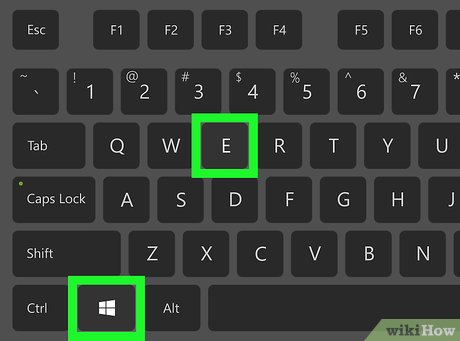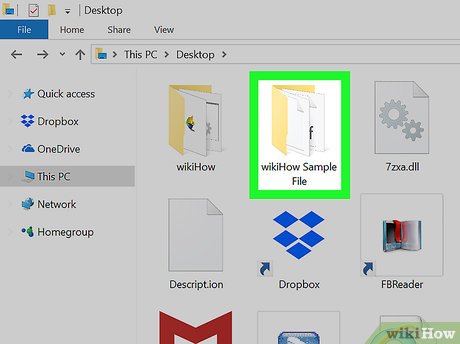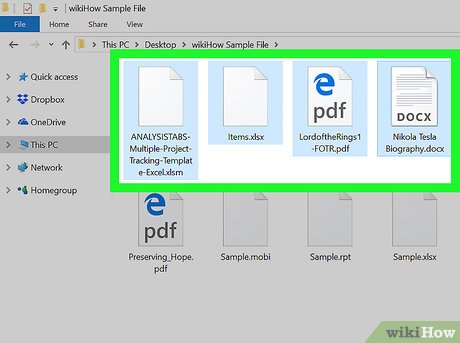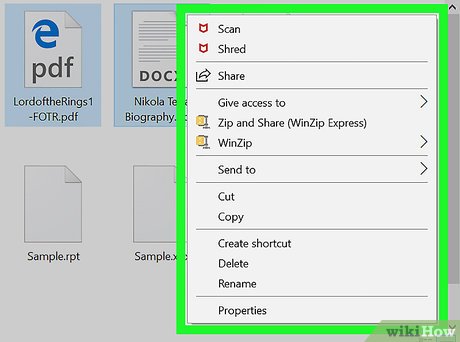How to Change File Names in Bulk on PC or Mac
Method 1 of 2:
Windows
-
 Press ⊞ Win+E to open the File Explorer. This displays a list of drives, folders, and files on your computer.
Press ⊞ Win+E to open the File Explorer. This displays a list of drives, folders, and files on your computer. -
 Open the folder with the files you want to change.
Open the folder with the files you want to change. -
 Select the files. To select more than one file at a time, hold Ctrl as you click each file. If you prefer, you can click and drag a box around the files you want to edit.
Select the files. To select more than one file at a time, hold Ctrl as you click each file. If you prefer, you can click and drag a box around the files you want to edit.- To select all of the files in a folder, click somewhere in the folder, then press Ctrl+A.
-
 Right-click the highlighted files. A context menu will expand.
Right-click the highlighted files. A context menu will expand. -
 Click Rename. It's near the bottom of the menu. The names of all of the files are now edible.
Click Rename. It's near the bottom of the menu. The names of all of the files are now edible. -
 Type in the name you want for your files and press ↵ Enter. This changes all of the file names to what you've typed, but each subsequent file will end with a number.
Type in the name you want for your files and press ↵ Enter. This changes all of the file names to what you've typed, but each subsequent file will end with a number.- For example, if you name the first file Cat.gif, the next file will be called Cat(2).gif, then Cat(3).gif, etc.
Method 2 of 2:
macOS
-
 Open Finderon your Mac. You'll usually find this icon on the Dock.
Open Finderon your Mac. You'll usually find this icon on the Dock.
-
 Open the folder with the files you want to change.
Open the folder with the files you want to change. -
 Select the files. To select more than one file at a time, hold ⌘ Command as you click each file. If you prefer, you can click and drag a box around the files you want to edit.
Select the files. To select more than one file at a time, hold ⌘ Command as you click each file. If you prefer, you can click and drag a box around the files you want to edit.- To select all of the files in a folder, click somewhere in the folder, then press ⌘ Command+A.
-
 Click the Action button. It's at the top of the Finder window.
Click the Action button. It's at the top of the Finder window. -
 Click Rename [number of] Items.
Click Rename [number of] Items. -
 Click Format from the drop-down menu. It's the menu at the top of the set of rename tools.
Click Format from the drop-down menu. It's the menu at the top of the set of rename tools. -
 Select a name format for the style format. Select Name and Index, Name and Counter, or Name and Date depending on your needs.
Select a name format for the style format. Select Name and Index, Name and Counter, or Name and Date depending on your needs. -
 Type a name for the files into the 'Custom Format' box. This is the name that will appear at the beginning of each file name.
Type a name for the files into the 'Custom Format' box. This is the name that will appear at the beginning of each file name.- For example, if you type 'Cat' and selected 'Name and Counter' as your format, the files will be called Cat-1, Cat-2, etc.
-
 Enter a starting number. If you're numbering the files, you can start with 1, 2, or any other number.
Enter a starting number. If you're numbering the files, you can start with 1, 2, or any other number. -
 Click Rename. The selected files are now renamed sequentially using the formatting you entered.
Click Rename. The selected files are now renamed sequentially using the formatting you entered.
Share by
Isabella Humphrey
Update 04 March 2020
















